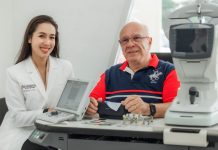The new European Code Against Cancer was launched in October and outlines 12 things that individuals can do to reduce their risk for cancer. Top of the list is tobacco, followed by healthy body weight, avoiding too much sun and alcohol, but there are also several new recommendations including breast-feeding, and hormone replacement therapy (HRT), and also about vaccinations and organized screening programs.
The code was drawn up by the International Agency for Research on Cancer (IARC), the specialized cancer agency of the World Health Organization, with the participation of the European Commission. The code is couched in everyday language and is aimed at individuals, giving guidance on “what I can do to reduce my cancer risk?”
New is the advice to women that breast-feeding reduces the mother’s cancer risk, and so should be encouraged, and that HRT increases the risk for certain cancers (breast, endometrial, and ovarian), and so should be limited.
Also new is the advice to have girls vaccinated against human papillomavirus (HPV) (to prevent cervical cancer), which adds on to the advice already in the code to have newborns vaccinated against hepatitis B (to prevent liver cancer).
Tobacco has been in the code since its earliest version in 1987, but even here there are new adjustments. Tobacco is the number one cause of cancer, so this has to be re-emphasized over and over again for successful prevention, but for the first time we are emphasizing the importance of a smoke-free environment in the workplace and at home, which contributes to helping people to stop smoking and also, of course, reduces the risk of second-hand smoke.
Another change in the new code is the emphasis on organized screening programs, for colorectal cancer in both men and women and for breast and cervical cancer screening in women. The new emphasis here is that this screening should be part of organized programs, because only these can ensure high quality screening.
The recommendation on exercise is spelled out very simply: “Be physically active in everyday life. Limit the time you spend sitting.” People should know that even small amounts of activity are beneficial, climbing the stairs instead of using the elevator, even 15 to 30 minutes of brisk walking every day, all of this adds up to reduce their risk of cancer. “There is no need to run a marathon or go to the gym every day,” said the IARC spokesman.
Really there is nothing that I would call a new breakthrough or anything like that, but it does spell out the “healthy” lifestyle, which if followed will decrease your risk of developing cancer.
Below I have reprinted the 12 points from the IARC, and even though it is headed the “European Code” it still holds true for SE Asia.
European Code Against Cancer: 12 Ways to Reduce Your Cancer Risk
1 Do not smoke. Do not use any form of tobacco.
2 Make your home smoke free. Support smoke-free policies in your workplace.
3 Take action to be a healthy body weight.
4 Be physically active in everyday life. Limit the time you spend sitting.
5 Have a healthy diet:
• Eat plenty of whole grains, pulses, vegetables, and fruits.
• Limit high-calorie foods (foods high in sugar or fat) and avoid sugary drinks.
• Avoid processed meat; limit red meat and foods high in salt.
6 If you drink alcohol of any type, limit your intake. Not drinking alcohol is better for cancer prevention.
7 Avoid too much sun, especially for children. Use sun protection. Do not use sunbeds.
8 In the workplace, protect yourself against cancer-causing substances by following health and safety instructions.
9 Find out if you are exposed to radiation in your home. Take action to reduce high radon levels. (This one is not so relevant to us here in SE Asia.)
10 For women:
• Breast-feeding reduces the mother’s cancer risk. If you can, breast-feed your baby.
• HRT increases the risk of certain cancers. Limit use of HRT.
11 Ensure your children take part in vaccination programs for:
• Hepatitis B (for newborns)
• HPV (for girls).
12 Take part in organized cancer screening programs for:
• Bowel cancer (men and women)
• Breast cancer (women)
• Cervical cancer (women).




